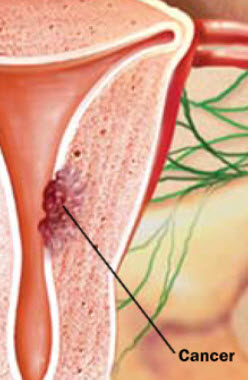Does PCOS Increase Your Risk of Endometrial Cancer?
PCOS has a few rather serious long-term downsides, chiefly the increased risk of cardiovascular disease and diabetes.
But let's not forget cancer as another possible risk.
Free PCOS Newsletter

The University of Queensland recently reported a study of 156 women with polycystic ovary syndrome vs. 398 other women. All of the women were less than 50 years old.
The researchers discovered that the PCOS women had four times the risk of endometrial cancer than the women without the disease. Endometrial cancer is a cancer occurring in the lining of the uterus.
Symptoms such as hirsutism (excessive hair growth) and very irregular periods were significantly associated with endometrial cancer risk.
The concerning aspect of this study is that the risk of endometrial cancer was increased before the women even reached 50 years of age. Usually, this cancer is noticed in women over 50 years old.
According to a recent study from the University of California (San Francisco), there is increasing evidence that the glandular and metabolic abnormalities in polycystic ovarian syndrome may have complex effects on the endometrium, including endometrial dysfunction, infertility, increased miscarriage rate, endometrial hyperplasia (abnormal cell growth), and endometrial cancer.
The Causes Are Complex
The possible reasons for this are complex and not fully understood. However, we'll mention a couple of them here.
Disordered sex hormones are one factor. They include elevated estrogen without the opposing effects of progesterone. This is referred to as "estrogen dominance". The other sex hormone factor is that androgen (male hormones) are too high.
Another major factor is insulin resistance and too much insulin floating around in the blood. The effects of this excess are many. For example, it appears that too much insulin may inhibit the normal process of cell development, leading to unusual cells that are seen as either pre-cancerous or cancerous.
The solution is NOT to go out and get a hysterectomy to minimize your risk of endometrial cancer. A better approach is to start rebalancing your hormones with diet, exercise, stress management, nutritional supplements (if needed) and other natural therapies.
We urge you to be proactive and take action now to improve your health and control polycystic ovarian syndrome so you won't have to worry as much about endometrial cancer or getting a hysterectomy.
Endometrial cancer usually occurs later in life. A typical pelvic exam is not very good at detecting it in its early stages. If you have any abnormal bleeding or unexplained abdominal pain or pelvic cramping, always consult with your doctor without delay.
We also recommend you get regular medical checkups.
Related Cancer Articles
Sources:
Spurdle AB et al, Polycystic ovary syndrome increases the risk of endometrial cancer in women aged less than 50 years: an Australian case-control study, Cancer Causes Control. 2010 Dec;21(12):2303-8.
Giudice LC, Endometrium in PCOS: Implantation and predisposition to endocrine CA, Best Pract Res Clin Endocrinol Metab. 2006 Jun;20(2):235-44
Get Answers to your Questions about
- Fertility
- Weight Control
- Hair Loss
- Stress
- Unwanted Hair
- Acne...and more!
FREE PCOS Report
and Newsletter

Your email is safe with us. We respect your privacy, and you may unsubscribe at any time.
Recent Articles
-
PCOS Long Journey to The Happy End
Apr 30, 18 07:24 PM
Hi Girls, Maybe my story will have one day a good end but I am not there yet. Until I was 31 years old I lived my dream, having lovely husband, good -
PCOS and Miscarriage
Apr 17, 18 04:03 PM
Proper diet and natural supplements can help the body maintain a pregnancy through successful delivery.
-
How to Deal with PCOS and Stress
Apr 04, 18 04:19 PM
Your body has a natural capacity to heal itself if you provide it with the necessary tools.





